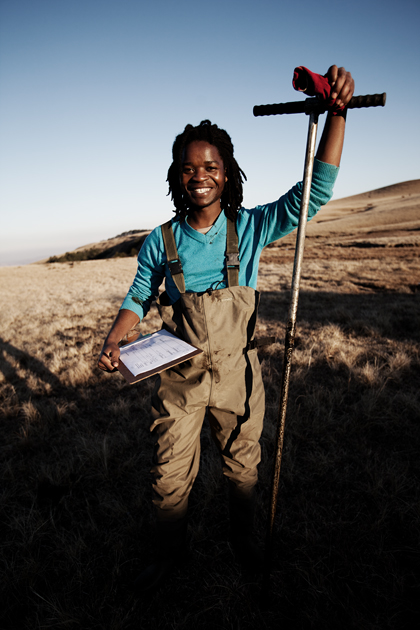Abraham Nqabutho Dabengwa
Postdoctoral Fellow
GENUS/ Evolutionary Studies Institute
University of the Witwatersrand

Biography
I am a postdoctoral fellow at Genus who is passionate about the long-term ecological dynamics and functioning of African grassland and savanna ecosystems. Climate, fire, large mammalian herbivores, and humans are considered important drivers of prehistoric establishment and persistence of relatively open grassland and savanna landscapes. My research is focused on documenting and evaluating new and old evidence of ecosystem drivers. I am part of the Open Life Science project with the International Committee on Open Phytolith Science, a global initiative aiming to improve collaboration and openness of scientific research. When I’m not working, I enjoy reading on a wide array of topics, hiking, jogging, travelling, and visiting museums and galleries.
Disciplines
Palaeoecology; landscape ecology; grassland ecology; fire and large mammal ecological dynamics; functional ecology; human-wildlife interactions; global environmental change; restoration ecology.
Fields of study
The idea that distributions of dynamic savanna and grassland biomes are legacies of vegetation consumers such as fires and large mammal herbivores from ecological to evolutionary timescales is gaining acceptance. Consumers are charged with maintaining alternate grass-dominated ‘open ecosystems’ with low tree cover by actively promoting plants with traits supporting consumer persistence. The trait-driven vegetation community states according to Bond (2005) are the green, brown, and black worlds representing ability in resource competition, tolerance to fires, and tolerance to high herbivore pressure, respectively. Similarly, rapid changes in climate, human development, and human manipulation of landscapes are linked with creating open ecosystems. However, these contrasting ideas have not been robustly tested at long timescales. To achieve better interpretations of sedimentary proxy signals of vegetation trait responses to environmental drivers, I propose a two-tier analysis of black and brown worlds that considers local wetland and surrounding landscape vegetation as remaining at disequilibrium (asynchrony) in drier climates because of strong herbivore control. By contrast, equilibrium (synchrony) between local and landscape vegetation responses is likely in mesic areas or climatic phases because high moisture limits fire and herbivore activity. In this study, I revisit two key sites in South Africa’s grass-dominated ecosystems, i.e., Wonderkrater (savanna) and Tswaing Crater (grassland). I plan to extend the proxy analysis of phytoliths, charcoal, coprophilous fungal spores, and soil elemental analysis to reconstruct past vegetation responses, fire and herbivore histories, and climate/sedimentation links from ca. 15 000 -100 000 years ago. I will identify ecosystem states and their drivers based on plant functional trait responses expressed by growth-forms and physiology using pollen and phytolith-based records, with the former associated with landscape and the latter local-scale processes. Correspondence between vegetation responses to herbivory or fire at both spatial scales will be assessed especially in periods of climate change and human development in the Stone Age. Results from this study will be critical to our understanding of proxy records, biome organization, consumer-resource dynamics, and human resource-use influences on biodiversity in open ecosystems. This knowledge will be valuable for informing future biodiversity adaptation strategies to climate change and for guiding evidence-based ecosystem restoration.
Awards and recognition
- NUST Book Prize (2005)
- Postgraduate Merit Award Wits (2008)
- Golden Key International Honour Society (2009)
- ACDI PhD Fellowship (2012-2014)
- Wilderness Wildlife Trust research award (2012)
- Dorothy Cameron Scholarship (2015)
- INQUA Travel Awards (2015/2019)
- National Research Foundation African Origins Scarce Skills Scholarship (2015)
- PAGES Travel Awards (2012/2016/2017)
- NRF SAEON PhD fellowship (2017)
- Pages Inter-Africa Mobility Research Award (2022)
